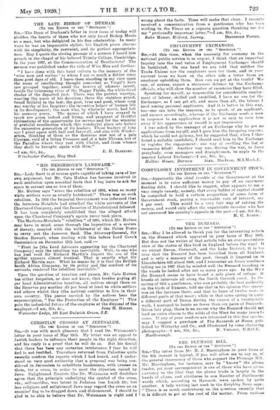" HIS NEIGHBOUR'S LANDMARK."
(To THE EDITOR or THE " SPECTATOR.") SIR,—Lady Scott is of course quite capable of taking care of her own argument, but Mr. Cato Hutton has become involved in such confusion upon essential facts that I beg leave to ask for space to correct one or two of them.
Mr. Hutton says "since the rebellion of 1893, when so many white settlers were so cruelly butchered." There was no such rebellion. In 1893 the Imperial Government was informed that the ferocious Matabele had attacked the white servants of the Chartered Company, and the Invasion of Matabeleland followed. It has been completely established that the alleged attack upon the Chartered Company's agents never took place.
• The Meshona-Matabele " rebellion" of 1896, which Mr. Hutton may have in mind, arose through the imposition• of a system of slavery, coupled with the withdrawal of the Police Force to carry out the Jameson Raid. The Attorney-General, Sir Gordon Hewart, when dealing with this before Lord Cave's Commission on December 12th last, said :- " First he [the Lord Advocate appearing for the Chartered Company] says the rebellion was inevitable. Well, to one who has just read Sir Richard Martin's Report the use of the epithet appears almost ironical. That is exactly what Sir Richard Martin says. What he means by it is that the British South Africa Company, by its policy and the conduct of its servants, rendered the rebellion inevitable."
Upon the question of taxation and passes, Mr. Cato Hutton has either forgotten, or does not know, that besides paying per head Administrative taxation, all natives except those on the Reserves pay another ...t1 per head at least to white settlers and others whilst they (the natives) continue to live in their own country. The passes carried by the natives bear the superscription, "For the Protection of the Employer "! This puts the industrial future of the employee at the disposal of the






































 Previous page
Previous page